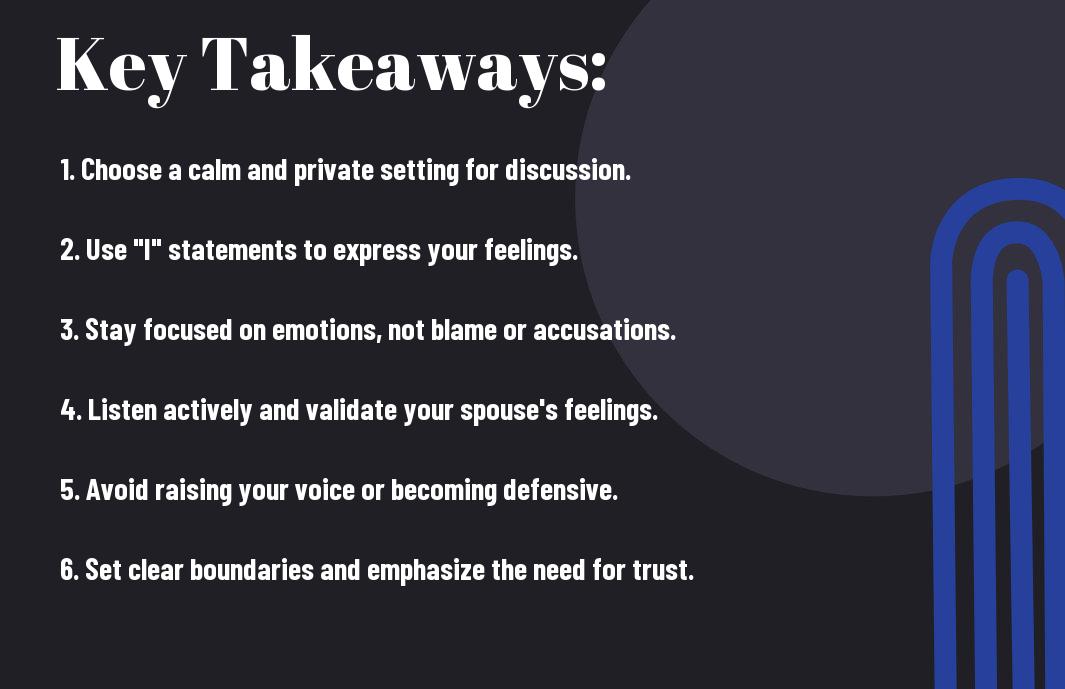Infidelity can be a devastating blow to any relationship, but addressing the issue openly can pave the way for healing and understanding. You may feel a surge of emotions like anger and betrayal, making it difficult to communicate effectively. However, maintaining control during this conversation is vital for constructive dialogue. By preparing yourself mentally, choosing the right time, and using respectful language, you can discuss your feelings without escalating tensions, ultimately enabling both you and your spouse to work through the complexities of infidelity together.

Key Takeaways:
- Approach the conversation calmly and choose a private setting to ensure both partners feel safe and comfortable.
- Express feelings using “I” statements to avoid blame, which helps maintain a constructive dialogue.
- Seek to understand your spouse’s perspective by asking open-ended questions and actively listening.
- Be honest about your emotions and thoughts, but avoid raising your voice or using accusatory language.
- Prepare for various outcomes and be open to hearing uncomfortable truths, as this can lead to healing.
- Consider seeking professional help, such as couples therapy, to facilitate a more productive discussion.
- Give each other time to process the conversation and agree to check in regularly about feelings moving forward.

Understanding Infidelity
Before you approach the topic of infidelity with your spouse, it’s vital to grasp what it truly entails. Infidelity can vary significantly in its nature, effects, and implications for your relationship. Understanding the nuances of infidelity can help you better articulate your feelings and concerns, leading to a more productive discussion.
Emotional vs. Physical Infidelity
An important distinction to make when discussing infidelity is between emotional and physical betrayal. Emotional infidelity occurs when a person forms a deep, emotional connection with someone outside the marriage without any physical involvement, whereas physical infidelity involves sexual relations. Both forms can profoundly impact your relationship, but addressing each type requires different approaches and considerations.
The Impact of Betrayal
The impact of betrayal in a relationship can be devastating and far-reaching. It often leads to feelings of loss, anger, and confusion, affecting your ability to trust not only your spouse but also yourself. Beyond the immediate emotional turmoil, the effects can ripple through every aspect of your life, including your sense of self-worth and your capacity to engage in healthy relationships in the future.
In addition, dealing with betrayal can evoke intense emotions that may cause you to question your relationship’s foundation. It’s common to experience an overwhelming sense of grief from the loss of security and intimacy you once shared. The feelings of isolation can escalate as you navigate this complex situation, making it imperative to seek support or counseling. Understanding these emotional responses can help you process your feelings and determine the best steps in moving forward.
Preparing for the Conversation
There’s no easy way to approach a conversation about infidelity, but thorough preparation can help you navigate this delicate situation. It’s imperative to gather your thoughts and feelings beforehand to ensure clarity in your message. You can learn more about effective strategies for discussing your concerns by visiting How To Talk To Your Spouse About Them Cheating.
Choosing the Right Time and Place
Choosing the right time and place for this discussion is vital. Opt for a private, comfortable setting where both of you can express yourselves openly without distractions. Avoid initiating this conversation during stressful moments or in public areas where emotions might escalate unproductively.
Setting Your Emotional State
An important aspect of preparing for this conversation is setting your emotional state. Keep in mind that your feelings will likely be intense, so approach the discussion when you feel more stable and centered. This will help maintain a calm environment for both you and your spouse.
For instance, consider engaging in relaxation techniques like deep breathing or mindfulness before the conversation. This can significantly enhance your calmness and composure. If you’re feeling overwhelmed by anger or betrayal, it’s advisable to take some time to process those emotions first. Entering this dialogue with a more balanced emotional state increases the chances of a constructive outcome and helps avoid escalations in conflict.
Communicating Effectively
Unlike casual conversations, discussing infidelity requires a thoughtful approach. Focus on maintaining a calm demeanor and creating a safe space for dialogue. Ensure you choose an appropriate time and place where both you and your spouse can express feelings without distractions. This allows you to address the issue without escalating tensions and fosters a more productive discussion.
Using “I” Statements
Statements that begin with “I” instead of “you” help express your feelings without sounding accusatory. For example, say “I feel hurt and betrayed” rather than “You hurt me.” This small change can lead to a more open and honest conversation, as it emphasizes your emotions rather than placing blame on your spouse.
Active Listening Techniques
The ability to actively listen is vital during discussions about infidelity. This means fully concentrating on what your spouse is saying without planning your response while they speak. Give them your undivided attention, nod in acknowledgment, and ask clarifying questions to demonstrate your engagement. By doing so, you validate their feelings and encourage a more open exchange, which improves understanding and connection.
Considering that communication is a two-way street, employing techniques like summarizing what your spouse has said can enhance mutual understanding. Use phrases like “What I hear you saying is…” to show you are processing their words. This reinforces that you value their perspective. Additionally, maintaining eye contact and avoiding interruptions can significantly improve the effectiveness of your dialogue. Ensuring a supportive atmosphere will help both of you feel more secure and ready to tackle difficult emotions together.
Addressing Emotions
Once again, it’s imperative to approach the topic of infidelity with sensitivity to the emotions at play. Infidelity can stir intense feelings of pain, anger, and betrayal. By fostering an environment that encourages honest dialogue about these emotions, you can facilitate healing and understanding. Establishing a safe space for expression will create an opportunity for both you and your spouse to acknowledge the depth of your feelings without resorting to blame or defensiveness.
Validating Feelings
Along the path of conversation, it is important to validate each other’s feelings. Your spouse may need to express their hurt, while you, in turn, may need to convey your remorse. By recognizing and affirming each other’s emotional experiences, you will foster a sense of connection and understanding that can ease the tension surrounding the situation.
Managing Anger and Hurt
With varied emotions running high, managing your anger and hurt effectively will be key to a productive conversation. It’s natural to feel a surge of strong emotions, but allowing these feelings to dictate the conversation can lead to destructive outcomes. Instead, focus on expressing your feelings thoughtfully, using “I” statements to avoid accusatory language that could escalate tensions.
But you must also acknowledge that it’s not about suppressing your emotions; it’s about finding a constructive way to express them. Allow yourself to feel the anger and hurt, but channel these feelings into a dialogue that promotes healing. When discussing the infidelity, strive to articulate what you’ve felt rather than pointing fingers. This approach can help to create an atmosphere of empathy and mutual understanding, thereby paving the way for healing and reconciliation.
Finding Common Ground
After uncovering infidelity, it’s necessary to find common ground with your spouse. Start by acknowledging the pain and hurt both of you are experiencing. Open a dialogue where you listen actively and share your feelings honestly. This shared understanding can lead to a more productive conversation, helping you navigate the complex emotions involved and setting the stage for healing. Focus on your relationship’s foundation, rather than just the betrayal itself, to foster a sense of partnership in overcoming this challenge together.
Exploring Underlying Issues
The path to finding common ground involves delving into the underlying issues that may have contributed to the infidelity. Use this opportunity to identify unmet needs or unresolved conflicts in your relationship. Talk openly about your feelings, desires, and any behaviors that have created distance between you. By addressing these concerns, you can work together towards a deeper understanding and more meaningful connection.
Rebuilding Trust and Connection
Between you and your spouse, rebuilding trust and connection is an ongoing process that requires patience and commitment. Acknowledge the emotions tied to the infidelity and express your genuine desire to mend and strengthen your bond. Engage in open conversations that focus on reigniting your emotional intimacy, and set aside time for shared activities. This concerted effort will help create a safe environment where both of you can gradually rediscover your connection and foster trust once again.
Another significant aspect of rebuilding trust and connection is to establish clear communication. Share your expectations moving forward and discuss how you both can contribute to a healthier relationship. Apologize sincerely, and if you are the one who strayed, be prepared to take responsibility for your actions. Consider creating a plan that outlines steps you both can take to facilitate trust-building. As you navigate this journey, it’s important to celebrate progress and remain open to vulnerability, allowing your relationship to grow stronger.

Seeking Professional Help
Now, considering professional help can be a pivotal step in addressing infidelity. A therapist can facilitate difficult conversations, provide tools for healing, and assist you in navigating the emotional upheaval that follows betrayal. This support can help both you and your spouse to understand the underlying issues and work towards rebuilding trust in a safe environment.
Couples Therapy Options
Any type of couples therapy can offer a structured setting to address the fallout from infidelity. Options include traditional face-to-face sessions, online counseling, or even group therapy. These settings allow for open dialogue, ensuring both partners feel heard while the therapist moderates and guides the conversation toward productive outcomes.
When to Consider Professional Guidance
Couples should seek professional guidance when emotions run high and communication feels impossible. A therapist can help disentangle your emotions, establish a safe space for dialogue, and identify patterns of behavior that may have contributed to the infidelity. This support can be invaluable in achieving a deeper understanding and fostering healing.
Therapy not only helps you address the effects of infidelity, but it can also illuminate underlying issues in your relationship. By working with a skilled professional, you can explore underlying resentments, communication barriers, and emotional disconnects that may have led to this crisis. A therapist provides a neutral perspective, helping you to navigate your feelings without escalating conflict. Ultimately, embracing therapy can pave the way for healing and help you both move forward—whether together or apart—with clarity and purpose.
Summing up
Hence, approaching the topic of infidelity with your spouse requires a thoughtful and composed demeanor. Engage in active listening, articulate your feelings without blame, and choose an appropriate setting for this difficult conversation. Stay focused on understanding each other rather than shifting into defensiveness or anger. By fostering open communication, you can navigate this challenging situation with respect and clarity, laying the groundwork for healing and potential reconciliation in your relationship.
FAQ
Q: How should I begin the conversation about infidelity with my spouse?
A: Start by finding a quiet and private place where both of you feel safe to express your thoughts. Clearly express your desire to have an honest conversation. Use “I” statements to communicate your feelings instead of accusations. For example, saying “I feel hurt and confused” creates a more open environment for dialogue.
Q: What emotions are normal to experience during this discussion?
A: It is typical to feel a range of emotions such as hurt, anger, sadness, or even guilt. Allow yourself to acknowledge these feelings, but try to focus on maintaining your composure. Taking deep breaths or pausing before responding can help in keeping your emotions in check, so you can communicate effectively without escalating the situation.
Q: How can I encourage my spouse to be honest without pressuring them?
A: Approach the conversation with empathy and patience. Let your spouse know that you value their honesty and want to understand their perspective. You can say something like, “I’d appreciate your honesty, as it can help us understand each other better.” It’s important to establish a tone that is inviting rather than confrontational.
Q: What if my spouse becomes defensive during the conversation?
A: If your spouse reacts defensively, it is important to stay calm and refrain from escalating the conversation further. Acknowledge their emotions and give them space to express themselves. You might say, “I understand this is difficult for you; I’m here to listen.” Redirecting the dialogue towards understanding rather than blame can help lower defenses.
Q: How can we move forward after this conversation, regardless of the outcome?
A: Regardless of how the conversation goes, establish a plan for moving forward. This could include seeking couples therapy, setting boundaries, or dedicating time to rebuild trust. Agree on next steps together. It’s important to be open about your needs and expectations, so both partners know how to proceed positively after such a heavy discussion.
